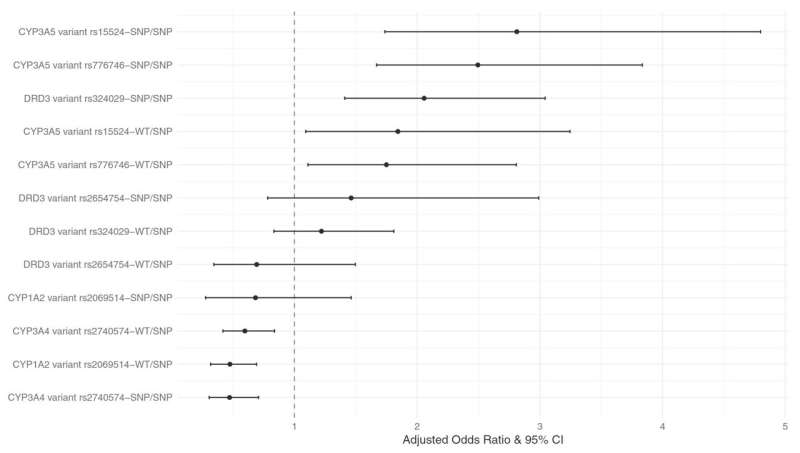This article has been reviewed according to Science X's editorial process and policies. Editors have highlighted the following attributes while ensuring the content's credibility:
fact-checked
trusted source
proofread
Research examines the role of genetics in opioid use disorder

New research out of the University of Cincinnati examines the association between genetics and the presence of opioid use disorder (OUD). The study identified six single nucleotide polymorphisms (SNPs) or genetic variants that are linked to OUD.
The study was published in the journal Clinical Pharmacology & Therapeutics.
"We are trying to identify some of the genetic variants that might play into OUD," says Caroline Freiermuth, MD, associate professor in the Department of Emergency Medicine at the UC College of Medicine and principal investigator for the study. "Patients received an oral swab that gets put inside their cheek, and those swabs were sent off for genetic testing looking for 180 single nucleotide polymorphisms."
According to the Centers for Disease Control and Protection, more than 107,000 people in the U.S. died in 2021 from drug overdose, with overdose deaths involving synthetic opioids increasing 23% from the year before. The economic cost of OUD and opioid-related overdose mortality exceeds $1 trillion annually in the United States.
The study enrolled about 1,300 patients within three large urban emergency departments in Ohio, which has ranked in the top five for opioid overdose deaths since 2014.
"We wanted to determine for any random person who comes to the emergency department what their genetic link might be and do they now or did they ever have opioid use disorder in their life, and do we think their genetics have played a role in that," says Freiermuth. "We found that there were quite a few single nucleotide polymorphisms that seem to be associated with opioid use disorder."
The study found that although genetics play a role in disease, there is also significant interaction from the environment. Freiermuth says further study is needed to highlight the true impact of the genetic variants and how external factors contribute to the development of OUD. Further exploration of biogeographical genetic ancestry groups and their association with OUD is warranted, the study concluded,
"I think this is really exciting because it should help us try to figure out who is truly at risk when they are exposed to opioids and that could make it easier for us to decide who we can and can't prescribe opioids to," Freiermuth says. "This could help determine who might need further monitoring in the future instead of just blanket saying 'nobody should ever get more than a certain amount."
More information: Caroline E. Freiermuth et al, Genetic Variants Associated With Opioid Use Disorder, Clinical Pharmacology & Therapeutics (2023). DOI: 10.1002/cpt.2864




















